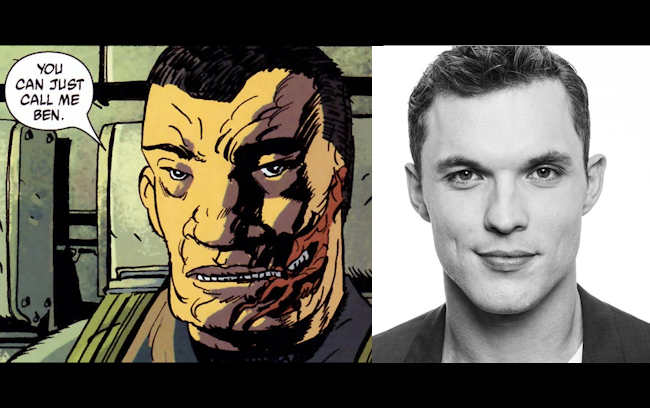
In the latest round of Hollywood whitewashing of Asian or Asian American characters, British actor Ed Skrein (The Transporter Refueled, Deadpool) has been cast in an upcoming reboot of Dark Horse Comics’ Hellboy series. Skrein will play Major Ben Daimio, a Japanese American member of the Bureau for Paranormal Research and Defense with the power to shapeshift into a were-jaguar when under physical or psychological duress.
Skrein is not Japanese.
Daimio’s Japanese American heritage has influenced the character’s history and storylines. According to Wikipedia, Daimio is the grandson of the Crimson Lotus (also known as, Yumiko Daimio), a Japanese spy active in New York City before and during World War II. When Ben Daimio’s relationship to the Crimson Lotus is revealed, his patriotism is questioned despite having been born in the United States, having been raised in a military family by his father, a war hero, and having served tours as a highly-decorated US Marine. Daimio’s body is possessed by a jaguar spirit when he is killed while on a mission in Bolivia, and he is brought back to life by it although his face still bears the scars of that mission.
The casting of Skrein to play the Japanese American Daimio is only the most recent example of what is quickly becoming an absurdist pattern of whitewashing (often specifically of Asian and Asian American characters) in mainstream Hollywood. Examples are plentiful: Jake Gyllenhaal as the titular Prince of Persia; the whitewashing of the entire cast of The Last Airbender; Emma Stone’s casting in Aloha as the multiracial Chinese American Allison Ng; Scarlett Johansson’s lead role in the American remake of Ghost in the Shell as Major Motoko Kusanagi, a Japanese woman turned cyborg; Tilda Swinton as Dr. Strange‘s Ancient One, a character portrayed in Marvel Comics as an elderly Tibetan man; and the casting of White actors to play the main characters of Netflix’s Deathnote. And now, we have Ed Skrein as Japanese American Ben Daimio.
This whitewashing represents an insidious trend, particularly for an industry where Asian Americans are underrepresented both in front of and behind the camera: according to USC’s Annenburg School for Communication and Journalism, only 1.3% of Hollywood’s leading roles go to Asian actors, and only 3% of directors of Hollywood’s top 1000 films are Asian or Asian American. Of lead or speaking roles that do go to Asian actors, only one-third of those roles go to Asian or Asian American women.
Meanwhile, films that engage in whitewashing of Asian or Asian American characters often pair that problematic casting with overt erasure of the Asian and Asian American experience: Aloha failed to offer any meaningful discussion of Native Hawaiian or multiracial Asian American identity; Dr. Strange sidestepped discussion of the politics of Tibetan independence with their choice to racebend the Ancient One; and with Scarlett Johansson’s casting as Motoko Kusanagi, Ghost in the Shell presented an appallingly violent storyline with regard to Asian women’s bodies.
Hollywood can offer no reasonable excuse for why the Hollywood whitewashing phenomenon continues. Talented Asian and Asian American actors are plentiful both in the United States and in overseas filmmaking industries; many have built substantive resumes showing that they can carry leading role status in feature films. Hollywood has expressed a desire to break into Chinese moviegoing markets, and have overtly pandered to Chinese audiences by including Asian faces as background characters (but only rarely in major roles) and have added Chinese product placements to some scenes (sometimes to disastrous results). Studies show that films with diverse casts fare well at the box office, while most films that engage in whitewashing of non-white characters often flop. Backlash over whitewashing of Asian and Asian American roles has been ongoing for nearly two years and has been featured in major news media outlets: no producer can now claim ignorance of the issue.
There is no reason I can think of as to why Hollywood continues to whitewash Asian and Asian American characters except racism. Nothing else explains the persistence of Hollywood whitewashing other than Hollywood producers’ stubborn refusal to let go of their presumptions that the American moviegoer’s gaze is white and male, alongside their false stereotype that Asian and Asian American faces are innately less beautiful, less familiar, and less American than white ones; and that reasoning amounts to nothing more than pure, distilled, unfiltered Orientalism.
Update (8/23/2017): Hellboy executive producer Christa Campbell responded to the controversy on Twitter with a cavalier dismissal of whitewashing concerns (H/T: Reader M.S.) . Instead, Campbell offered the tired post-racial trope of “not seeing color or race”, as if just closing one’s eyes to one’s own problematic racial behavior renders it all alright.
https://twitter.com/christacampbell/status/900480190513430528
This response is perhaps even more offensive than the whitewashing itself. It is clear evidence that conversations about race, racial representation, and diversity have not permeated into the upper echelons of mainstream Hollywood film-making.
Why was Ed Skrein cast as Ben Daimio? Because there are still more people empowered to sit in these film’s production meetings who espouse noxious and patronizing post-racial attitudes like the one exemplified above, and few people invited to the table who are willing and able to have difficult and necessary conversations about race in America, as well as the creative and intellectual laziness it takes to perpetuate Hollywood whitewashing.
Update (8/23/2017, 9:30PM PST): Here’s more from Campbell, where she cites her Thai family as evidence that she’s not racist.
https://twitter.com/christacampbell/status/900564268273106946
Update (8/23/2017, 10:57PM PST): Campbell has since deleted her tweets. Thank goodness for WordPress caching of embedded tweets.
